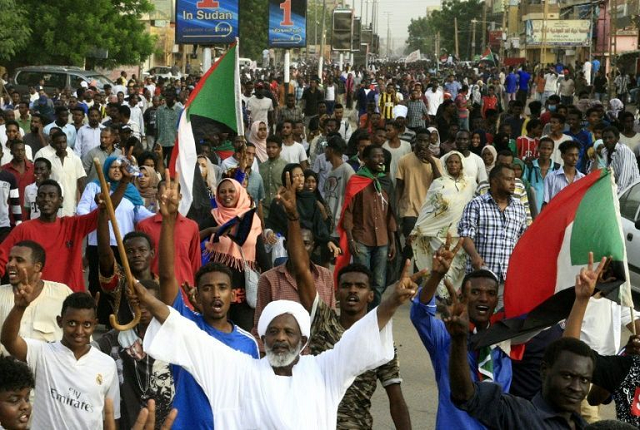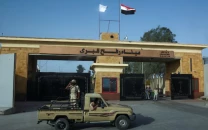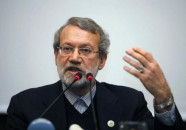Hundreds protest killing of students as Bashir trial set
Six people shot dead at the rally against growing shortage of bread and fuel in the city

PHOTO: AFP
Tragedy struck Al-Obeid on Monday when six people were shot dead at a rally against a growing shortage of bread and fuel in the city.
"Blood for blood, we don't want compensation," chanted women and men as they marched in Al-Obeid on Wednesday, an AFP correspondent reported.
Many carried Sudanese flags and some held photographs of those killed as they gathered downtown after marching through several parts of the city.
Sudanese protesters to suspend contacts with military rulers
Protest leaders had earlier said that those killed included five high school children, but a doctor at Al-Obeid hospital that received the casualties told AFP Wednesday only four were minors. The other two were aged 23 and 55, according to their families.
"It is unacceptable that young people are being killed," said demonstrator Fatima Mohamed, as crowds behind her chanted the slogans from protests that have rocked the country for months. "These schoolchildren were chanting only slogans. Why were they shot with bullets?"
It was the sudden tripling of bread prices in December that sparked the mushrooming protests which led to the toppling of Bashir by the army in April.
Bashir is due to face trial next month on charges of corruption.
"Today was the first session of his trial, but the authorities were unable to bring him due to security reasons, so the judge informed us that the trial will now start on August 17," defence lawyer Hashim al Gaaly told AFP.
Prosecutors say Bashir faces charges related to "possessing foreign currency, corruption and receiving gifts illegally".
In April, Sudan's army ruler General Abdel Fattah al-Burhan announced that more than $113 million worth of cash in three currencies had been seized from Bashir's residence.
Frequent power cuts as well as shortages of bread and fuel are a main source of frustration in Sudan.
Long queues outside bakeries in Al-Obeid are a common sight. "Getting food has become a tough task," said Muawiya Saad, who works and lives in the city.
"You have to wait for an hour or even more. Often you pass by one bakery and find that it is shut because there is no electricity." Monday's killings in Al-Obeid triggered international outrage, and Burhan condemned the incident as an "unacceptable crime" that called for swift accountability.
The EU called for the perpetrators "to be promptly brought to justice by the Sudanese authorities."
Brussels continues to support mediation efforts and urged the Transitional Military Council (TMC) and the Forces for Freedom and Change (FFC) to "set aside their differences and... pave the way for a civilian-led transition in Sudan," EU spokeswoman Maja Kocijancic said in a statement on Wednesday.
Further delays risk fuelling further violence, she added.
Sudan police tear gas protesters as hundreds attempt march on palace
The latest killings made "the formation of a transitional government that is broadly supported by the Sudanese people even more urgent. The EU will only be able to engage with a government in which civilians exercise demonstrable authority," Kocijancic added.
The shooting of protesters sparked demonstrations in the capital Khartoum and other cities, with crowds of schoolchildren taking to the streets to denounce them.
Late on Tuesday, the authorities ordered all schools across the country to close indefinitely, and imposed a night-time curfew in Al-Obeid and three other cities in the state of North Kordofan.
Protest leaders from the Sudanese Professionals Association (SPA) piled on further pressure on Wednesday by calling for a nationwide "million-strong march" on Thursday to denounce the Al-Obeid killings.
"We hold the TMC to be responsible for protecting the participants, because whenever there is a march, people are killed," prominent protest leader Ismail al-Taj told reporters, urging the perpetrators of Monday's killing be brought to justice.
Demonstrators have accused the feared Rapid Support Forces (RSF) of shooting dead the protesters.
The Al-Obeid killings led to the suspension of talks between the protest leaders and ruling generals over the formation of a civilian administration.
A military council seized power after Bashir's ouster, sparking further protests with demonstrators calling on the ruling generals to hand power to civilians.
The generals and protest leaders agreed a power-sharing deal in mid-July, but they have yet to hash out sensitive issues concerning the powers of a proposed joint civilian-military ruling body, the deployment of security forces and immunity for generals over protest-related violence.
The Sudanese Communist Party, a member of the protest movement, said it will not participate in negotiations with the generals.
"We are not pulling out of the Alliance for Freedom and Change [protest movement] but we will not participate in any negotiations with the military council," party leader Mohamed Mokhtar al-Khatib told reporters on Wednesday.
"The military council is an extension of the old regime and we will not participate in any transitional institutions also."



















COMMENTS
Comments are moderated and generally will be posted if they are on-topic and not abusive.
For more information, please see our Comments FAQ